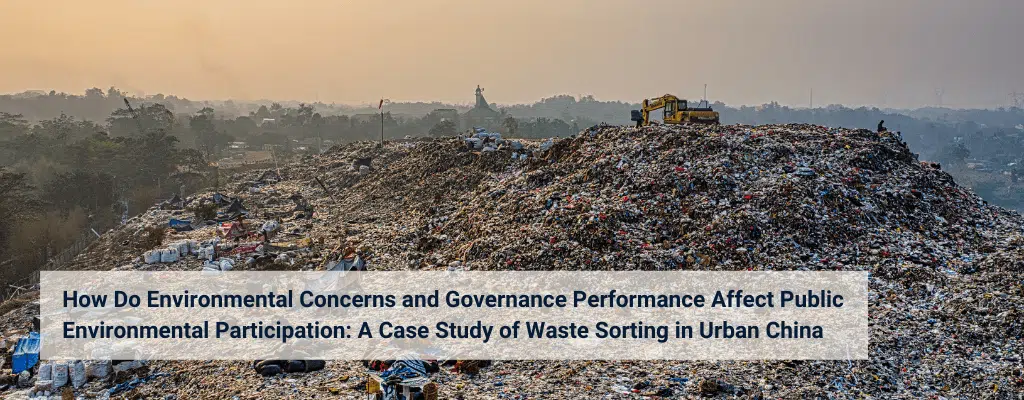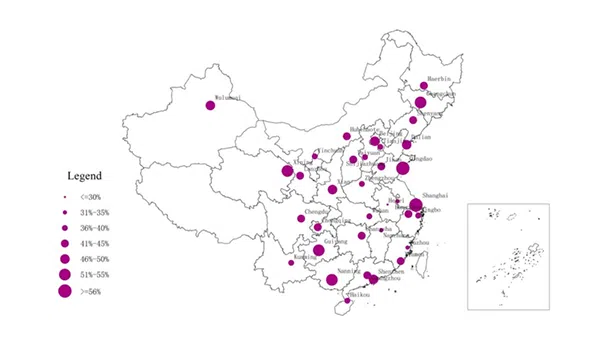
In their study, the authors examine how environmental concerns and governance performance affect public environmental participation in China, since pollution has become a social concern and a threat for public health.
The expansion of the urban population in China has resulted in a large amount of household waste. However, at that time, in the 1990’s, environmental issues were not a priority for the government or the public. Although the government has been trying to address these problems since 2000, it cannot do so alone. Nonetheless, and despite improvements in the current conditions for public participation in environmental governance, public participation in government projects remains relatively low.
When it comes to answering the research question of how environmental problems and governance performance affect public participation in environmental matters, the public’s environmental concerns do not seem to have enough of an effect on their participation. And the more that people trust the government on environmental management issues, the less they participate in projects.
Thus, this study focuses on factors that have changed significantly in China in recent years, such as environmental quality, governance performance, and different disposal methods.
Yixiong Huang is an assistant professor at ESSCA Shanghai and member of the EU*Asia Institute. He has kindly accepted to answer some questions about this article.
Your article gives insight into the environmental engagement of the Chinese population and the role of the government in terms of waste management. Finally, it suggests governmental measures to expand public participation in China regarding environmental protection.
Can you briefly summarise your findings?
The paper mainly discussed the impact of public concerns and government performance on public environmental participation, taking the just-implemented urban waste sorting initiative in China as an example. We found that public environmental concerns did not lead to more environmental engagement. Moreover, the more the public recognizes the government’s environmental governance performance, the less they will participate in environmental protection. In addition, due to the consideration of self-interest or lack of environmental awareness, those who oppose waste incineration in waste terminal disposal tend to take a non-participatory role in waste sorting.
How did you come up with this research project?
China’s rapid economic growth and large population have led to numerous environmental and sustainable development challenges. In particular, the urban waste disposal capacity has been severely inadequate, and the construction of new incineration facilities has led to mass protests. Therefore, in 2019, the central government put forward the initiative to implement waste sorting in the country. In many places, however, public participation is low, forcing the government to hire full-time staff and volunteers to “monitor” and “supervise” the public’s recycling practices. Thus, in this context, we hope to explore the factors that affect public engagement in environmental protection, especially their participation in urban waste sorting.
What objective do you want to achieve with this research and this article? / Who is targeted by the content?
The contribution of this paper is to provide suggestions/advice for public managers, including government policymakers and other environmental stakeholders, to promote public participation in waste sorting and other environmental engagement. For example, the conclusion of this paper mentioned that the government should allow more stakeholders to involve in the boost of public environmental participation and improve public awareness and behavior of environmentalism through education, publicity, mobilization, and incentives.

Percentage of waste sorting strong supporters in China’s main cities
What have been the contributions of each of the three authors?
The data for the paper came from the “Survey of Chinese Urban Residents’ Attitudes toward Environmental Protection,” which was conducted by the Public Opinion Center of Shanghai Jiao Tong University in 2019. It covered 35 major cities across China. I and two co-authors participated in the questionnaire design and the implementation of the survey. Dr. Hang Yin was mainly responsible for data processing and initial analysis. Dr. Kuiming Wang was mainly responsible for project management and fund acquisition, and I was responsible for formal analysis and writing.
Yin, Hang, Yixiong Huang, and Kuiming Wang. 2021. “How Do Environmental Concerns and Governance Performance Affect Public Environmental Participation: A Case Study of Waste Sorting in Urban China” International Journal of Environmental Research and Public Health 18, no. 19: 9947. https://doi.org/10.3390/ijerph18199947





